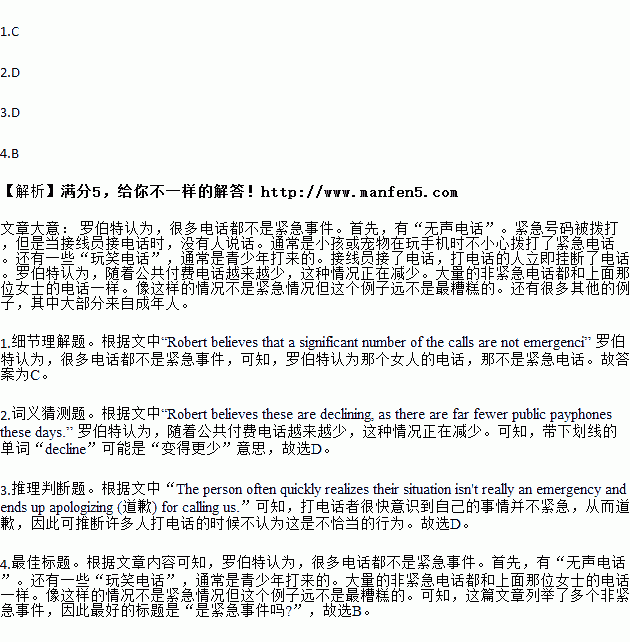题目内容
The woman was very frightened. What could she do? She dialed 999. The emergency call operator Robert Naylor answered the call immediately.


"Please help me! It's in my bathroom! It's moving!" the woman cried. "What is it that's moving?" Robert answered calmly.
"A spider!" the woman shouted back at him.
Robert believes that a significant number of the calls are not emergencies. The actual number across the country is close to 75%.
Firstly, there are "silent calls". The emergency number is dialed, but when an operator answers, no one speaks. Often it's a small child or even a pet who has been playing with her phone and has accidentally rung the emergency number.
Then there are "joke calls", often from teenagers. An operator answers the phone and the caller immediately hangs up. Robert believes these are declining, as there are far fewer public payphones these days. "People are less interested to make a call when they are doing it from their own mobile phone and they know we have their number!"
The police always follow up both types of calls. It's a huge waste of money, the average (平均的) cost of responding to a silent or joke call is around £250.
The great numbers of the none-emergency calls are like those from the woman above. A situation like this isn't an emergency. But this example is far from the worst. What do you think of the following?
● A teenager girl in America called the police because her parents had decorated her room and she didn't like the color.
● A mother in Italy rang the emergency services when her 16-year-old son refused to get out of the bed.
● A Brazilian teenage boy rang and asked the police to remove a video of him from YouTube. In the video, the boy was falling off his bike.
There are many other examples, and most of these are from adults. These calls waste more than time and money. "If someone makes a joke call and the police manage to find them, then they can expect a fine of up to £5,000, and even a prison sentence (监禁)," warns Robert. "But for people whose emergency aren't really serious, we simply try to deal with their calls as quickly as possible," he continues. "The person often quickly realizes their situation isn't really an emergency and ends up apologizing (道歉) for calling us. But if someone refuses to listen, then we have to hang up. Someone with a real emergency is probably waiting to speak to us."
1.How did Robert think of the woman's call?
A.It was an emergency call. B.It was a joke call.
C.It was a none-emergency call. D.It was a silent call.
2.What does the underlined word "declining" probably mean?
A.Getting serious. B.Turning worse.
C.Getting useless. D.Becoming less.
3.Why are there so many none-emergency calls?
A.Operators give excellent service. B.Callers do not take any responsibilities.
C.Dealing with none-emergency costs little. D.Many don't consider it an improper behavior.
4.Which of the following is the best title for this passage?
A.Emergency services. B.Is it an emergency?
C.Different kinds of emergency calls. D.Who is to be responsible?
 天天向上一本好卷系列答案
天天向上一本好卷系列答案 小学生10分钟应用题系列答案
小学生10分钟应用题系列答案
